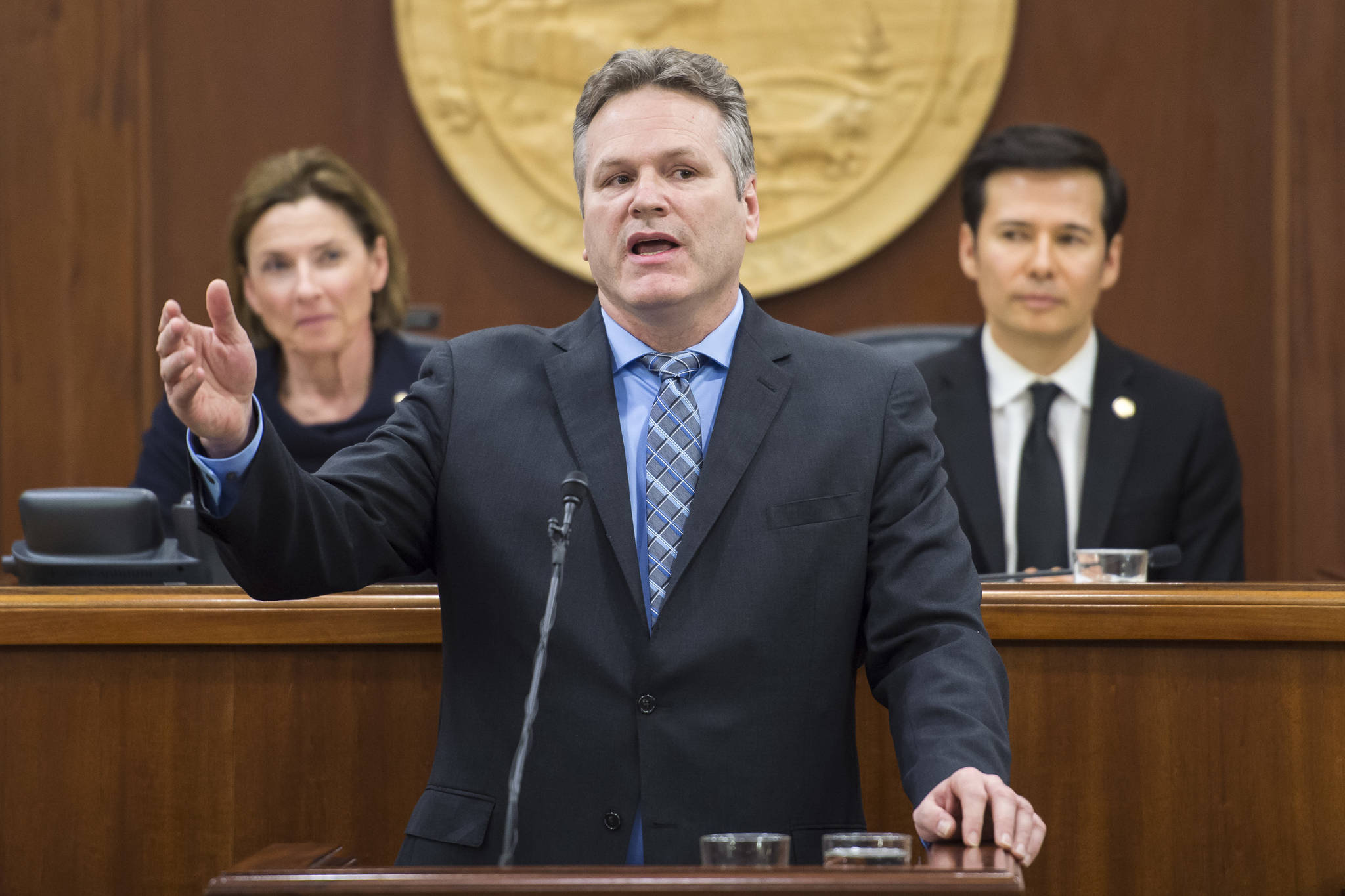Gov. Mike Dunleavy was supposed to “detail his vision for Alaska” in his first State of the State address on Monday. But he offered no specifics for “helping grow our economy” or putting the state on “a path towards a permanent fiscal plan.” Instead, he delivered a vision grounded in wishful thinking.
Dunleavy described the three constitutional amendments he’ll soon introduce as “the foundation” of his fiscal plan. The first includes “a spending limit and savings plan” that will allow the state “to save excess revenue when possible for future Alaskans.”
Nice idea. But it won’t help now because there’s no excess revenue to save.
The other two would prevent future governors and legislators from altering the amount of the Permanent Fund Dividend or raising taxes without a vote of the people.
[Gov’s crime message resonates, but Juneau lawmakers hesitant about constitutional amendments]
Getting any of these through the Legislature requires support by two-thirds of each chamber. That’s not likely to happen. Even if it did, the amendments still require voter approval, and the earliest that will be is the general election in November 2020.
Dunleavy can bypass the Legislature only if the people vote to convene a Constitutional Convention. But that can’t happen anytime soon either.
So, all three proposed amendments, even if he could get them passed, are irrelevant for balancing the budget the next two cycles.
The other dream he’d like to come true in the “near future” is about “all of the new industries coming to Alaska.”
To make it happen he’s put together “a team of experts with backgrounds in finance, marketing and research that will inform investors, industries and individuals that Alaska is open for business.” And as proof that “good old-fashioned capitalism and entrepreneurship” is all it takes to succeed in our high cost, cold and faraway northern setting, he offered the stories of two small Alaska businesses.
[Dunleavy announces board, commission appointments]
In 2012, Bambino’s Baby Food began making its products in the kitchen an Anchorage Pizza restaurant. They opened a manufacturing facility in 2017 and a local retail shop last spring. Their “all-natural, preservative-free, authentic meals optimized for infant nutrition” are now available at Anchorage area grocery stores and shipped to all 50 states.
The other business is Triverus LCC. The Palmer company began operations in a two-car garage in Anchorage in 2001. Four years later, the U.S. Navy awarded them a $2.4 million contract to design and manufacture two prototypes of a machine to clean the decks of U.S. aircraft carriers. Last year the Navy decided it wanted to purchase 35 of them.
These are great Alaskan-born success stories. But Triverus and Bambino weren’t overnight stars. And highlighting them doesn’t easily translate into enticement for outsiders to invest here.
Alaska has to compete with the rest of America, which is open for business too. For instance, Triverus’s highly specialized machine will be reconditioned every few years in a plant that also manufactures a smaller model for commercial and municipal applications. But it’s in Vermont.
The lessons here are it’ll take more than a vision to diversify Alaska’s private sector economy. And even if he can make it happen, like the amendments, it has no bearing on the budget shortfall. Which he’ll make worse by funding his promises of higher PFDs, back payments for the three years they were reduced, and the “war on crime” he announced on Monday.
And the only budget balancing tool he’s left himself with is a chainsaw.
That leads to the last disconnect in his “honest, straightforward look” at Alaska’s spending problem. Cutting $1.5 billion from the state budget means laying off hundreds of government employees. Less state contracts means jobs lost in the private sector too. The state’s already highest in the nation employment rate will rise, extending the six-year trend of people migrating south and prolonging the recession he hopes to end.
No team of experts can turn that dismal image into a pretty portrait that will attract business and industries to invest in Alaska.
As a senator, Dunleavy didn’t have the power to sell his vision to Alaskans. He may think he has it now. But the Legislature is still a co-equal branch of our government. Last year they recognized the need to cap the PFD to tap the fund’s investment earnings. Now they’ve got to help the governor find the door to reality.
• Rich Moniak is a Juneau resident and retired civil engineer with more than 25 years of experience working in the public sector. He contributes a weekly “My Turn” to the Juneau Empire. My Turns and Letters to the Editor represent the view of the author, not the view of the Juneau Empire.


